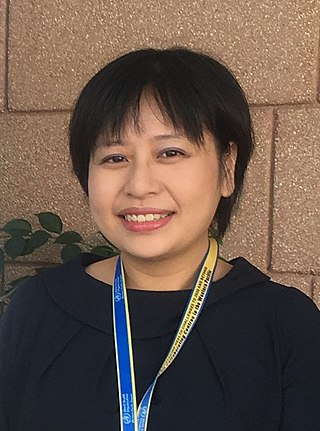
Dengue virus (DENV) is the cause of dengue fever. It is a mosquito-borne, single positive-stranded RNA virus of the family Flaviviridae; genus Flavivirus. Four serotypes of the virus have been found, and a reported fifth has yet to be confirmed, all of which can cause the full spectrum of disease. Nevertheless, scientists' understanding of dengue virus may be simplistic as, rather than distinct antigenic groups, a continuum appears to exist. This same study identified 47 strains of dengue virus. Additionally, coinfection with and lack of rapid tests for Zika virus and chikungunya complicate matters in real-world infections.
Infectious salmon anemia (ISA) is a viral disease of Atlantic salmon caused by Salmon isavirus. It affects fish farms in Canada, Norway, Scotland and Chile, causing severe losses to infected farms. ISA has been a World Organisation for Animal Health notifiable disease since 1990. In the EU, it is classified as a non-exotic disease, and is monitored by the European Community Reference Laboratory for Fish Diseases.

Vincent R. Racaniello is a Higgins Professor in the Department of Microbiology and Immunology at Columbia University's College of Physicians and Surgeons. He is a co-author of a textbook on virology, Principles of Virology.
The National Institute of Virology in Pune, India is an Indian virology research institute and part of the Indian Council of Medical Research (ICMR). It was previously known as 'Virus Research Centre' and was founded in collaboration with the Rockefeller Foundation. It has been designated as a WHO H5 reference laboratory for SE Asia region.
The Friedrich Loeffler Institute (FLI), is the Federal Institute for Animal Health of Germany, that country's leading animal disease center. The institute was founded in 1910 and named for its founder Friedrich Loeffler in 1952. The FLI is situated on the Isle of Riems, which belongs to the City of Greifswald. Riems is a very small island that can be reached via a dam, which can be closed off in case of an outbreak. Due to these circumstances, Riems posed the perfect location for one of the most modern animal health research facilities in the world.

The Vaccine Research Center (VRC), is an intramural division of the National Institute of Allergy and Infectious Diseases (NIAID), part of the National Institutes of Health (NIH), US Department of Health and Human Services (HHS). The mission of the VRC is to discover and develop both vaccines and antibody-based products that target infectious diseases.

Lisa Ellen Hensley is the associate director of science at the Office of the Chief Scientist, National Institute of Allergy and Infectious Disease Integrated Research Facility in Frederick, Maryland. She was previously a civilian microbiologist in the virology division of the United States Army Medical Research Institute of Infectious Diseases (USAMRIID). Hensley is one of the premier researchers of some of the world's most dangerous infections, including Ebola hemorrhagic fever, Lassa fever, the coronavirus diseases Severe acute respiratory syndrome (SARS) and Middle East respiratory syndrome (MERS), and smallpox. She has been involved in research uncovering critical mechanisms in the pathogenesis of hemorrhagic fever viruses, and has used those discoveries to develop candidate therapeutic drugs for their treatment.
Ann M. Arvin is an American pediatrician and microbiologist. She is the Lucile Salter Packard Professor of Pediatrics and Professor of Microbiology & Immunology Emerita at Stanford University. Arvin is a specialist of the Varicella zoster virus (VZV) and a prominent national figure in health. Arvin is currently the chief of the infectious diseases division of pediatrics at the Lucile Packard Children's Hospital, as well as the former Stanford's Vice Provost and Dean of Research.

Zika virus is a member of the virus family Flaviviridae. It is spread by daytime-active Aedes mosquitoes, such as A. aegypti and A. albopictus. Its name comes from the Ziika Forest of Uganda, where the virus was first isolated in 1947. Zika virus shares a genus with the dengue, yellow fever, Japanese encephalitis, and West Nile viruses. Since the 1950s, it has been known to occur within a narrow equatorial belt from Africa to Asia. From 2007 to 2016, the virus spread eastward, across the Pacific Ocean to the Americas, leading to the 2015–2016 Zika virus epidemic.
Adolfo García-Sastre,(born in Burgos, 10 October 1964) is a Spanish professor of Medicine and Microbiology and co-director of the Global Health & Emerging Pathogens Institute at the Icahn School of Medicine at Mount Sinai in New York City. His research into the biology of influenza viruses has been at the forefront of medical advances in epidemiology.
Thomas Solomon is Professor of Neurology, director of the Institute of Infection and Global Health at the University of Liverpool, and director of the National Institute for Health and Care Research (NIHR) Health Protection Research Unit in Emerging and Zoonotic Infections. In 2021 he was elected Fellow of the UK Academy of Medical Sciences.
Lisa Ng is a Singaporean viral immunologist. In 2008, she became the first Singaporean and the first woman to win the ASEAN Young Scientist and Technologist Award for her work in developing diagnostic kits for Avian Influenza and Sars-CoV. She has been featured as part of the "Beyond Curie" project as a pioneer in viral immunology, as well as being inducted into the Singapore Women's Hall of Fame. Her ongoing research includes endemic tropical diseases and Sars-CoV-19.

Robert Ellis Shope was an American virologist, epidemiologist and public health expert, particularly known for his work on arthropod-borne viruses and emerging infectious diseases. He discovered more novel viruses than any person previously, including members of the Arenavirus, Hantavirus, Lyssavirus and Orbivirus genera of RNA viruses. He researched significant human diseases, including dengue, Lassa fever, Rift Valley fever, yellow fever, viral hemorrhagic fevers and Lyme disease. He had an encyclopedic knowledge of viruses, and curated a global reference collection of over 5,000 viral strains. He was the lead author of a groundbreaking report on the threat posed by emerging infectious diseases, and also advised on climate change and bioterrorism.
Umesh Chandra Chaturvedi was an Indian virologist, immunologist, medical microbiologist, CSIR Emeritus Scientist and a former chairman of the Bharat Immunologicals and Biologicals Corporation. The founder head of the department of microbiology at King George's Medical University, he is known for his studies on Dengue virus infection. Chaturvedi is an elected fellow of all the three major Indian science academies viz. Indian Academy of Sciences, National Academy of Sciences, India and the Indian National Science Academy as well as the Royal College of Pathologists and National Academy of Medical Sciences. The Council of Scientific and Industrial Research, the apex agency of the Government of India for scientific research, awarded him the Shanti Swarup Bhatnagar Prize for Science and Technology, one of the highest Indian science awards for his contributions to Medical Sciences in 1981.

Shahid Jameel is an Indian virologist and academic. Dr. Jameel is the Sultan Qaboos bin Said Fellow at Oxford Centre for Islamic Studies and Research Fellow, Green Templeton College, University of Oxford. He serves as the Principal Investigator for the Centre's project on Public Health, Science and Technology in Muslim societies. Previously he was the director of the Trivedi School of Biosciences since its inception in the year 2020 at Ashoka University. He was formerly head of the scientific advisory group to the Indian SARS-CoV-2 Genomics Consortia (INSACOG) established in December 2020, and the chief executive officer of Wellcome Trust DBT India Alliance. Known for his research in hepatitis E virus, Jameel is an elected fellow of all the three major Indian science academies viz. National Academy of Sciences, India, Indian Academy of Sciences, and Indian National Science Academy. The Council of Scientific and Industrial Research, the apex agency of the Government of India for scientific research, awarded him the Shanti Swarup Bhatnagar Prize for Science and Technology, one of the highest Indian science awards for his contributions to Medical Sciences in 2000.
Dr. Manmohan Parida, Sc ‘G’ assumed the charge of Director DRDE, Gwalior with effect from 01st October, 2021. He obtained his graduation in Veterinary Science from Odisha Veterinary College as best graduate with three Gold Medals into his credit. He earned his Masters in Veterinary Virology from prestigious Indian Veterinary Research Institute, Mukteswar and further obtained his Doctorate Jiwaji University, Gwalior in Microbiology. He was also awarded with Monbusho Fellowship from Japanese Govt and pursued Post Doctoral Research Scientist at Institute of Tropical Medicine, WHO reference center for research on arboviruses, Nagasaki, Japan.
William W. Hall is the chair of medical microbiology and professor emeritus at the Centre for Research in Infectious Diseases at University College Dublin.

Emmie de Wit is a Dutch-American virologist. She is chief of the molecular pathogenesis unit at the Rocky Mountain Laboratories. Her research combines pathogenesis studies with detailed molecular analyses to identify molecular determinants of severe respiratory tract disease within the virus and the host.

Kizzmekia "Kizzy" Shanta Corbett is an American viral immunologist. She is an Assistant Professor of Immunology and Infectious Diseases at Harvard T.H. Chan School of Public Health and the Shutzer Assistant Professor at the Harvard Radcliffe Institute since June 2021.

Sherry Moi Meng Ling is a Malaysian virologist, currently serving as a professor at the Graduate School of Medicine, the University of Tokyo. Her research focuses on innate immune system to mosquito-borne virus infection and field epidemiology.









